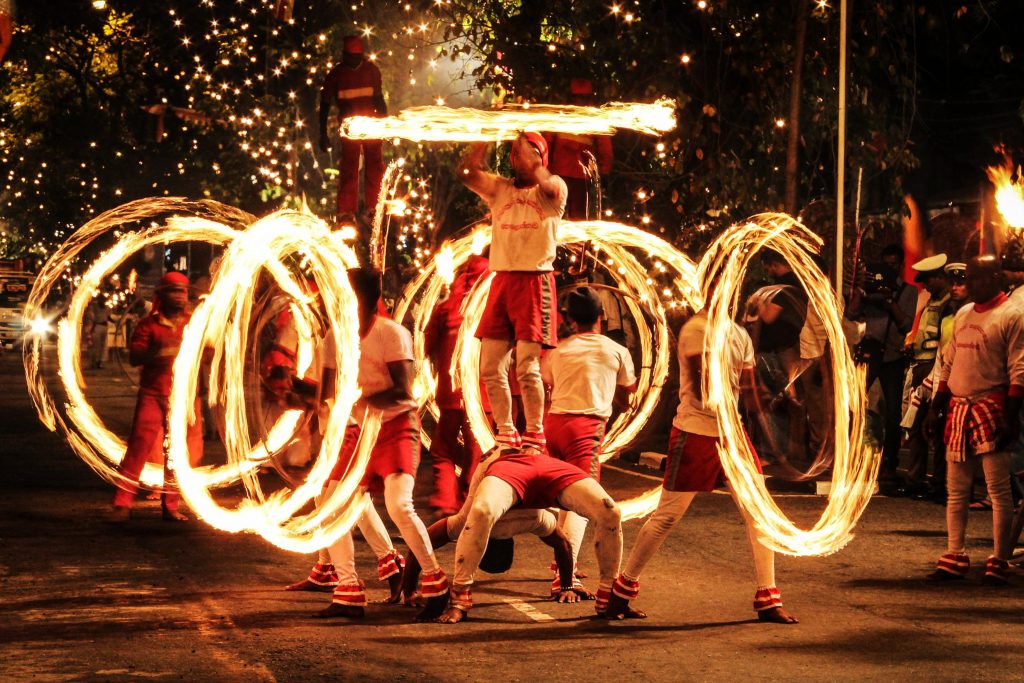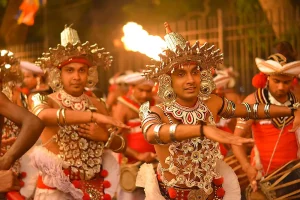Discover the Rich & Colorful Culture of Sri Lanka
Introduction – Culture of Sri Lanka
Sri Lanka, known as the “Pearl of the Indian Ocean,” is not only famous for its breathtaking landscapes and golden beaches but also for its deep-rooted and diverse culture. With influences from Buddhism, Hinduism, Portuguese, Dutch, and British colonization, Sri Lankan culture is a rich tapestry of traditions, festivals, arts, and cuisine that continues to thrive across the island.
Religion and Spiritual Life
Religion plays a central role in the lives of Sri Lankans. The majority of the population practices Buddhism, with beautiful ancient temples such as Temple of the Tooth (Kandy) and Dambulla Cave Temple reflecting the island’s spiritual heritage. Hinduism, Islam, and Christianity are also practiced widely, fostering a spirit of religious coexistence.
Festivals and Celebrations
Sri Lanka’s cultural calendar is packed with colorful festivals:
- Sinhala and Tamil New Year (April): Celebrated with traditional games, rituals, and sweet treats.
- Vesak (May): Marks the birth, enlightenment, and passing of Lord Buddha. Streets glow with lanterns and decorations.
- Esala Perahera (July/August): A grand cultural parade in Kandy, featuring dancers, drummers, and decorated elephants.
- Deepavali and Ramadan: Celebrated by Hindu and Muslim communities, showing the island’s diversity.
Traditional Arts and Dance
Sri Lankan traditional arts are both spiritual and expressive:
- Kandyan Dance: A vibrant, rhythmic dance with elaborate costumes and drums.
- Kolam and Mask Making: Used in folk theater and rituals, especially in the southern coastal regions.
- Batik and Handloom: Colorful handmade textiles that showcase artistic skill and cultural motifs.
Language and Literature
The official languages are Sinhala and Tamil, with English widely spoken. Sri Lanka has a rich tradition of oral storytelling, poetry, and ancient inscriptions. Today, both modern literature and classical texts contribute to a strong literary culture.
Sri Lankan Cuisine
Food is a core part of cultural identity. Sri Lankan cuisine is known for its bold spices, coconut-based curries, and rice dishes:
- Rice and curry: A daily staple with various vegetables, meats, and sambols.
- Hoppers (Appa): Bowl-shaped pancakes, often served with eggs or spicy chutney.
- Kottu Roti: A popular street food made by chopping roti with vegetables, eggs, or meat.
- Sweets like Kavum and Kokis: Especially made during festive times.
Family, Hospitality & Lifestyle
Sri Lankans are known for their warm hospitality and strong family values. Guests are treated with respect and generosity. Traditional values emphasize respect for elders, community bonding, and modesty in social behavior.
Conclusion
Sri Lankan culture is a beautiful fusion of tradition and diversity, shaped by centuries of history, religion, and interaction with the world. Whether you’re visiting a village temple, enjoying a spicy curry, or watching a traditional dance, you’ll experience a culture that is as welcoming as it is unique.


